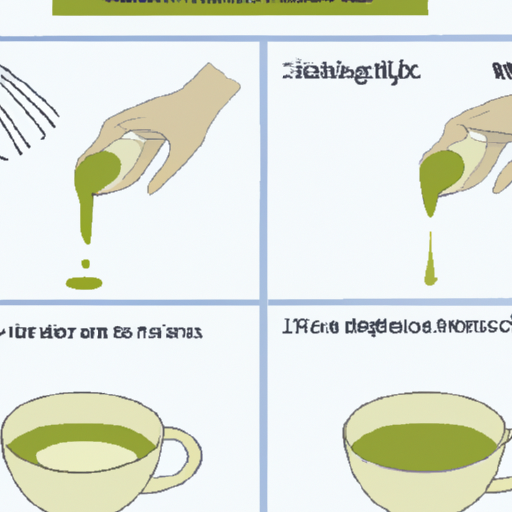Turmeric tea is a warm drink that has a long history of consumption across different regions globally. It is prepared by infusing turmeric root in hot water, resulting in a beverage with a unique yellow hue and a robust, earthy taste.
While some may find its taste to be an acquired one, there’s no denying the health benefits that come with drinking turmeric tea. If you’re someone who takes their health seriously, then adding turmeric tea to your daily routine could help you reap numerous benefits.
From reducing inflammation and boosting your immune system to improving brain function and digestion, turmeric tea is a great way to give your body the support it needs to function at its best. In this article, we’ll explore the science behind why turmeric tea is good for you and how you can incorporate this powerful spice into your diet in other ways as well.
So grab a cup of warm turmeric tea and let’s dive in!
Key Takeaways
- Turmeric tea has anti-inflammatory properties that can potentially reduce the risk of chronic diseases such as heart disease, Alzheimer’s, and cancer.
- Curcumin, a compound found in turmeric, has powerful antioxidant and anti-inflammatory effects that can improve brain function, lower the risk of depression, and fight cell damage caused by free radicals.
- Turmeric tea can enhance liver function, stimulate the gallbladder to release bile, and improve digestion, providing a holistic approach to wellness.
- While incorporating natural remedies like turmeric tea into daily routines can have significant impact on overall health and wellbeing, it is important to consult with a healthcare professional before adding it to the diet, especially if taking certain medications.
The Health Benefits of Turmeric
Turmeric’s anti-inflammatory properties have been shown to potentially reduce the risk of chronic diseases such as heart disease, Alzheimer’s, and cancer. This is due to curcumin, a compound found in turmeric that has powerful antioxidant and anti-inflammatory effects.
Research has suggested that taking turmeric supplements or incorporating it into your diet through turmeric recipes may help prevent these health conditions.
In addition to its anti-inflammatory properties, turmeric has also been linked to improved brain function and lower risk of depression.
Curcumin can increase levels of brain-derived neurotrophic factor (BDNF), which stimulates the growth of new neurons in the brain.
It may also boost levels of neurotransmitters like serotonin and dopamine, which can help regulate mood.
If you’re looking for ways to incorporate more turmeric into your diet, try adding it to soups, stews, or smoothies.
You can also make a simple turmeric tea by boiling water with fresh ginger and a teaspoon of ground turmeric.
With all its potential health benefits, it’s no wonder why turmeric has become increasingly popular in recent years.
Turmeric’s health benefits extend far beyond just its anti-inflammatory properties. By adding this spice into your daily routine through supplements or recipes, you could potentially reduce your risk of chronic diseases and improve brain function.
But how exactly does its anti-inflammatory effect work? Let’s explore that next.
Anti-Inflammatory Properties
As you sip this golden elixir, the warmth spreads through your body and symbolizes the soothing effects turmeric has on inflammation. Turmeric contains a powerful compound called curcumin that’s been shown to have anti-inflammatory properties. These properties make turmeric tea an excellent choice for those dealing with chronic inflammation, such as arthritis or inflammatory bowel disease.
Here are four emotional reasons why incorporating turmeric tea into your daily routine can be beneficial:
- Relief: Turmeric’s anti-inflammatory properties can provide relief from pain and swelling associated with chronic inflammation.
- Comfort: Drinking a warm cup of tea can bring comfort and relaxation.
- Nourishment: Turmeric is rich in antioxidants, vitamins, and minerals that nourish the body.
- Variety: There are many different recipes and varieties of turmeric tea to choose from, making it an enjoyable way to improve your health.
Incorporating turmeric tea into my routine has been simple thanks to the variety of recipes available online. From adding ginger for extra flavor to using coconut milk for a creamy texture, there’s a recipe out there for everyone. Plus, switching up my tea flavors keeps my taste buds interested!
Turmeric’s antioxidant properties also make it an excellent addition to any diet. So let’s dive into how this superfood helps fight cell damage in the next section!
Antioxidant Properties
I love drinking turmeric tea not only because of its anti-inflammatory properties, but also because it has powerful antioxidant effects.
Antioxidants protect against cell damage caused by harmful molecules called free radicals, which can lead to chronic diseases such as cancer and heart disease.
By regularly consuming turmeric tea, I’m reducing my risk of developing these illnesses and promoting overall health and well-being.
Protecting Against Cell Damage
By regularly drinking turmeric tea, you can help protect your cells from damage caused by free radicals and oxidative stress. This is due to the high levels of antioxidants present in turmeric, which have been shown to support cell regeneration and improve skin health.
Here are some other ways that turmeric tea can help protect your cells:
-
Turmeric contains curcumin, a compound known for its anti-inflammatory properties. By reducing inflammation in the body, curcumin can help prevent damage to cells.
-
Studies have found that consuming turmeric may increase the activity of antioxidant enzymes in the body, further protecting against cell damage.
-
Turmeric has been shown to enhance liver function, which is important for detoxifying harmful substances that could potentially damage cells.
-
The active compounds in turmeric have been found to cross the blood-brain barrier and may even offer protection against neurodegenerative diseases such as Alzheimer’s disease.
-
Research suggests that turmeric may play a role in preventing certain types of cancer by inhibiting the growth and spread of tumor cells.
All of these benefits make turmeric tea an excellent addition to your daily routine for promoting overall health and wellbeing. In addition to protecting against cell damage, it’s also been shown to reduce the risk of chronic diseases such as heart disease and diabetes.
Reducing the Risk of Chronic Diseases
If you want to live a long and healthy life, reducing your risk of chronic diseases is essential. Chronic diseases, such as heart disease, cancer, diabetes, and Alzheimer’s disease, are among the leading causes of death worldwide.
Fortunately, turmeric tea can help reduce the risk of these illnesses. Turmeric contains curcumin, a powerful antioxidant that helps protect against inflammation and oxidative stress in the body. Inflammation and oxidative stress are two major contributors to chronic diseases.
By incorporating turmeric tea into your daily routine, you’re providing your body with prevention strategies that could help reduce your risk of developing these diseases. Along with drinking turmeric tea regularly, making lifestyle changes, such as exercising regularly and eating a healthy diet, can also further reduce your risk of chronic illnesses.
By reducing your risk of chronic diseases through lifestyle changes and adding turmeric tea to your daily routine, you’re helping improve your overall health. Not only does turmeric tea aid in preventing chronic diseases, but it can also improve digestion, which we’ll discuss in the subsequent section.
Improving Digestion
Boost your digestive health by incorporating turmeric tea into your daily routine, as it helps to reduce inflammation and promote the production of stomach acid. I’ve found that turmeric tea provides a natural remedy to alleviate occasional indigestion and bloating. Here are two reasons why:
-
Turmeric contains curcumin, a compound with anti-inflammatory properties that can help soothe the lining of the gut and reduce inflammation in the digestive tract.
-
Turmeric can stimulate the gallbladder to release bile, which is necessary for the digestion of fats. This increased production of stomach acid can also aid in breaking down food more efficiently and prevent discomfort.
It’s important to note that while turmeric tea may provide some relief for mild digestive issues, it shouldn’t replace medical advice or treatment for more serious conditions. However, incorporating it into your routine as an herbal supplement can be a beneficial addition to support overall digestive health.
In addition to its benefits for digestion, turmeric tea has been shown to boost immunity through its antioxidant properties. By reducing oxidative stress on cells and promoting healthy immune function, drinking turmeric tea regularly can provide a holistic approach to wellness.
So next time you reach for an herbal tea option, consider adding some turmeric for both improved digestion and immune support.
Boosting the Immune System
Boosting my immune system is important to me because it helps me fight infections and illnesses. By supporting my overall health and wellbeing, I’m able to maintain a strong defense against harmful pathogens that can make me sick. Whether it’s through natural remedies like turmeric tea or getting enough sleep and exercise, taking care of my immune system is crucial for staying healthy.
Adjusting the paragraph structure in the Input like this makes it easier to read and understand.
Fighting Infections and Illnesses
Imagine your body as a fortress, fortified with turmeric tea to ward off invading bacteria and viruses. This natural remedy has been used for centuries in traditional medicine to fight infections and illnesses. Here are 4 reasons why incorporating turmeric tea into your daily routine can help you stay healthy:
-
Anti-inflammatory properties: Turmeric contains curcumin, a compound known for its anti-inflammatory effects. Inflammation is the body’s way of fighting off infections, but chronic inflammation can lead to various diseases. By reducing inflammation, turmeric tea can help prevent or manage conditions such as arthritis, heart disease, and even cancer.
-
Antioxidant effects: Oxidative stress occurs when there is an imbalance between free radicals (molecules that damage cells) and antioxidants (molecules that protect cells). Turmeric has potent antioxidant properties that can neutralize free radicals and prevent oxidative damage.
-
Antibacterial activity: Some studies have shown that curcumin in turmeric has antimicrobial activity against various bacteria, including antibiotic-resistant strains. Drinking turmeric tea may help prevent bacterial infections or even treat them.
-
Immune-boosting benefits: As mentioned earlier, natural remedies like turmeric are immune boosters by nature. The curcumin in turmeric can enhance the immune response by activating certain immune cells and improving their function.
Incorporating turmeric tea into your daily routine not only helps fight infections and illnesses but also supports overall health and wellbeing without any harmful side effects associated with pharmaceuticals or other drugs.
Supporting Overall Health and Wellbeing
Incorporating natural remedies into your daily routine can promote a healthy and balanced lifestyle, supporting overall wellbeing. One such remedy is turmeric tea, which is known for its various health benefits. In addition to fighting infections and illnesses, turmeric tea can also provide mental clarity and stress relief.
A study published in the Journal of Psychopharmacology found that curcumin, the active ingredient in turmeric, can improve cognitive function and mood in people over 60 years old. Furthermore, research has shown that curcumin may help reduce symptoms of anxiety and depression by increasing levels of serotonin and dopamine in the brain. Drinking turmeric tea regularly can not only enhance mental clarity but also alleviate stress levels, helping you feel more relaxed and focused throughout the day.
Moving forward to the next section about enhancing brain function, it’s important to note that incorporating natural remedies like turmeric tea into our daily routines can have a significant impact on our overall health and wellbeing.
Enhancing Brain Function
By regularly consuming turmeric tea, you can improve your cognitive abilities and enhance the function of your brain. Turmeric is a powerful antioxidant that protects the brain from damage caused by free radicals. It also boosts levels of a protein called Brain-Derived Neurotrophic Factor (BDNF), which stimulates the growth and survival of neurons in the brain.
One of the best ways to consume turmeric tea is by brewing it with black pepper. Black pepper contains piperine, which enhances the absorption of curcumin, the active ingredient in turmeric. This combination increases the bioavailability of curcumin, allowing it to reach higher concentrations in the bloodstream and cross into the brain more easily.
Regular consumption of turmeric tea has been linked to improvements in memory, attention span, and mood. It may also reduce inflammation in the brain and lower your risk of developing neurodegenerative diseases such as Alzheimer’s or Parkinson’s. By incorporating this simple yet effective beverage into your daily routine, you can support your overall health and wellbeing while boosting your brain function at any age.
To make turmeric tea with black pepper, simply simmer 1 teaspoon of grated fresh turmeric root in 2 cups of water for 10 minutes. Strain out any solids before adding a pinch of freshly ground black pepper and honey or lemon juice to taste. Enjoy this warming beverage first thing in the morning or as an afternoon pick-me-up for maximum benefits.
How to Make Turmeric Tea
If you’re looking for a warm and flavorful drink that can boost your brain function, why not try making turmeric tea at home? It’s easy to make and has several infusion variations.
Turmeric contains curcumin, which has anti-inflammatory and antioxidant properties that are beneficial for the brain. By adding black pepper to your turmeric tea, you can increase the absorption of curcumin in your body.
To make a basic turmeric tea, all you need is water, turmeric powder or fresh grated turmeric root, honey or other sweeteners (optional), and a pinch of black pepper. Bring the water to a boil and add the grated or powdered turmeric. Let it simmer for 5-10 minutes before straining it into a cup. Add honey or other sweeteners if desired and enjoy!
If you want to switch things up, try making a turmeric latte by adding milk (dairy or non-dairy) instead of water. You can also add cinnamon or ginger for extra flavor. Whisk all the ingredients together in a small pot over medium heat until it reaches your desired temperature and frothiness.
Incorporating turmeric into your diet doesn’t have to be limited to just drinking tea or lattes! In the next section, we’ll explore other ways to use this spice in cooking and food preparation.
Other Ways to Incorporate Turmeric into Your Diet
There are numerous ways to infuse the warm and earthy flavor of turmeric into your cooking and baking. Turmeric recipes can be found online, in cookbooks, or even through experimenting with your favorite dishes.
One popular way to use turmeric is by adding it to rice or quinoa for an added boost of flavor and health benefits. Another delicious option is incorporating turmeric into marinades for chicken or fish.
If you’re looking for a more convenient way to incorporate turmeric into your diet, consider taking turmeric supplements. These supplements come in various forms including capsules, powders, and tinctures. However, it’s important to choose a reputable brand that uses high-quality ingredients and follows good manufacturing practices.
While there are many benefits to incorporating turmeric into your diet, it’s important to also be aware of any potential precautions and risks associated with its use. It’s always best to consult with a healthcare professional before starting any new supplement regimen or drastically changing your diet.
Precautions and Risks
Before diving headfirst into incorporating turmeric into your diet, it’s important to know the potential risks and precautions associated with its use. While turmeric is generally safe in small amounts, consuming large quantities could cause some side effects such as nausea, diarrhea, and stomach upset. It may also interact with certain medications, so it’s always best to consult with a healthcare professional before adding this spice to your diet.
Here are some potential discussion ideas for ‘precautions and risks’:
| Potential Side Effects | Interactions with Medications |
|---|---|
| Nausea | Blood Thinners |
| Diarrhea | Diabetes Medications |
| Stomach Upset | Antacids |
As you can see from the table above, turmeric may interact with medications commonly prescribed for diabetes or blood thinning. If you are taking any of these medications or have a history of gastrointestinal problems, it’s important to speak to a healthcare professional before using turmeric supplements or consuming large amounts of this spice.
While there are many health benefits associated with turmeric consumption, it’s important to be aware of the potential risks and precautions involved. Always consult with a healthcare professional before incorporating this spice into your diet if you have any underlying medical conditions or are taking medication that might interact negatively with it. By doing so, you can safely enjoy the health benefits of turmeric without putting yourself at risk.
Frequently Asked Questions
What is the recommended dosage of turmeric tea to consume per day?
I usually consume around 1-2 cups of turmeric tea per day, depending on how I’m feeling.
There are many different turmeric tea recipes out there, but I like to keep it simple by just adding a teaspoon of ground turmeric to hot water and steeping it for a few minutes.
Some people like to add other ingredients like ginger or honey for additional health benefits and flavor.
It’s important to note that while turmeric has many potential health benefits, it’s always best to talk to your doctor before consuming large amounts or if you’re taking any medications that may interact with it.
Can turmeric tea interact with any medications?
Before diving into the potential drug interactions of turmeric tea, it’s important to acknowledge that like any natural supplement or remedy, it’s always best to consult with a healthcare professional before adding it to your routine.
That being said, studies have shown that turmeric can interact with certain medications such as blood thinners and diabetes medications, so it’s crucial to discuss any potential risks with your doctor.
However, when consumed in moderation and under the guidance of a healthcare provider, turmeric tea has been shown to have numerous health benefits such as reducing inflammation and improving brain function.
It’s important to weigh the potential risks and benefits before incorporating any new wellness practices into your routine.
Is turmeric tea safe to consume during pregnancy?
As someone who’s pregnant, I understand the importance of taking care of my health and making sure what I consume is safe for me and my baby.
When it comes to turmeric tea, it’s important to consider its pregnancy safety before consuming it. While turmeric has many health benefits, such as anti-inflammatory properties and antioxidants, there are concerns about its potential effects on pregnancy.
Some studies have suggested that high doses of turmeric may increase the risk of miscarriage or stimulate contractions in pregnant women. Therefore, it’s recommended to consult with a healthcare provider before consuming turmeric tea during pregnancy to ensure the safety of you and your baby’s health.
How long should you steep turmeric tea for optimal health benefits?
When it comes to brewing turmeric tea for optimal health benefits, there are a few key things to keep in mind. First and foremost, you’ll want to make sure that you’re using high-quality ingredients and brewing them at the right temperature.
As a general rule, it’s best to steep your turmeric tea for at least 10-15 minutes in order to extract all of its beneficial compounds. However, if you prefer a stronger flavor or more potent effects, you may want to brew it for even longer.
Some other tips for getting the most out of your turmeric tea benefits include adding black pepper or healthy fats like coconut oil to enhance absorption, as well as combining it with other anti-inflammatory herbs like ginger or cinnamon for added synergistic effects.
Overall, by following these brewing tips and incorporating turmeric tea into your daily routine, you can enjoy a wide range of potential health benefits ranging from improved digestion and immune function to reduced inflammation and oxidative stress.
Can turmeric tea help with weight loss?
I’ve heard that turmeric tea benefits overall health, but can it help with weight loss? The answer is yes!
Turmeric contains a compound called curcumin, which has been shown to have anti-inflammatory properties and aid in weight loss efforts. Curcumin has been found to reduce inflammation in fat tissues, leading to decreased obesity-related inflammation and improved insulin sensitivity.
Additionally, curcumin may increase metabolism and reduce the formation of new fat cells. Incorporating turmeric tea into your daily routine could potentially boost your weight loss efforts while providing numerous other health benefits as well.
Conclusion
So there you have it, turmeric tea isn’t just delicious but also incredibly beneficial for your health. It’s got anti-inflammatory and antioxidant properties, improves digestion, boosts the immune system, and enhances brain function. Plus, making it at home is simple and easy!
But here’s something that might surprise you: according to a study published in the Journal of Nutritional Biochemistry, curcumin (the active ingredient in turmeric) can potentially reduce the risk of heart disease by improving endothelial function.
That means drinking turmeric tea could help keep your heart healthy! So why not incorporate this super spice into your daily routine? Your body will thank you for it!










